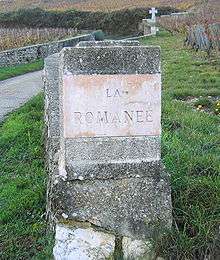La Romanée

La Romanée is an Appellation d'origine contrôlée (AOC) and Grand Cru vineyard for red wine in the Côte de Nuits subregion of Burgundy, with Pinot noir as the main grape variety.[1] It is situated within the commune of Vosne-Romanée and is a monopole of the winery Comte Liger-Belair. La Romanée borders on Romanée-Conti downslope in the east, AuxReignots upslope in the west, La Grande Rue in the south, and Richebourg in the north. The AOC was created in 1936.
Situation and Characteristics
Comprising an area of just 0.845 hectares (2.09 acres), La Romanée is the smallest Grand Cru in Burgundy and the smallest AOC in France.[2] "The slope is more marked (12%), the soil less clayey than La Romanée-Conti. A rendzina resting on Premeaux limestone and oolite, with brown calcareous soil in the upper part. Little soil, pebbly"[3] The soil structure is similar to Romanée-Conti, a fine sand-clay mixture "feeble in the sand fraction, mixed with pebbles, based on a friable Prémeaux limestone. The depth of surface soil is much less"[4]
"Very elegant ... fleshy ... very persistent, aromatic with the aromas of cherry, black berries (like blackcurrant or blackberry), spices and undergrowth. When this wine evolves, it is completed by notes of preserves and leather and aromas due to wood. Tasters often evoke the voluptuousness and the richness of a powerful wine and full wine for long keeping."[5] "La Romanée is powerful yet delicate with fine depth, silky tannins and a long finish"[6] "La Romanée is a little more full bodied and more virile than Romanée-Conti but with the same supreme elegance"[7]
Production
In 2008, 0.845 hectares (2.09 acres) of vineyard surface was in production within the AOC, and 28 hectoliters of wine were produced,[8] corresponding to around 3,700 bottles.
History
It was originally composed of six small parcels, whose area varied from one ouvrée to one journal situated in the vineyard or place-name Aux Echanges ... the declaration of the property of Saint-Vivant in 1512 says of it: 'belonging to Monsieur de Fangey ... and to several others.""[9] At least from the end of the 16th century on the present La Romanée consisted of parcels whose names varied over the centuries: "Es Echanges" (1602); "Es Echanges, Au Sentier du Pretre" (1664); "Au Sentier du Pretre" (the name of the path separating Romanée-Conti from Richebourgs) and "Au-dessus de la Romanée" (1769); "Echanges" (1771). A map of Romanée-Conti made in 1760 shows the six parcels which will become La Romanée just west of the path separating the two vineyards. An official document of 1790 refers to two of these parcels as "En La Romanée". Another document relating to the sale of another of the parcels in 1794 refers again to "d'Echanges"; but when this parcel is inherited in 1815 it is referred to as "En La Romanée".[10] "In October 1791 ... the commune of Vosne was divided into 14 sections ... The six owners of Aux Echanges were integrated into the Richebourgs"[9] From 1815 to 1826 General Louis Liger-Belair acquired the six parcels and in 1827 had them registered as a single parcel called La Romanée.[11] The Forey family tended the vines and made the wine till 1991, when following the death of the owner, the Canon Just, Louis-Michel Liger-Belair gradually took over the management of the domain.
AOC regulations
The main grape variety for La Romanée is Pinot noir. The AOC regulations also allow up to 15 per cent total of Chardonnay, Pinot blanc and Pinot gris as accessory grapes, but this is practically never used for any Burgundy Grand Cru vineyard. The allowed base yield is 35 hectoliters per hectare. A minimum planting density of 9,000 vines per hectare and a minimum grape maturity of 11.5 per cent potential alcohol is required.[12]
See also
References
- ↑ K. MacNeil The Wine Bible pg 191-195 Workman Publishing 2001 ISBN 1-56305-434-5
- ↑ Burgundy Report: Domaine du Vicomte Liger-Belair Archived 2009-08-25 at the Wayback Machine.
- ↑ Le Vin de Bourgogne by Jean-François Bazin, Hachette, 1996, p94
- ↑ "Cote d'Or" by Clive Coates, Weidenfield and Nicolson, 1997, p. 122
- ↑ Les Vins de Bourgogne by Thierry Mantoux, Hatier, 1997, p114
- ↑ The Great Domaines of Burgundy by Remington Norman & Charles Taylor, Kyle Cathie, 2010, p.83
- ↑ Camille Rodier quoted in Le Grand Livre de Bourgogne, Jacquemont & Quitanson, Editions du chene, 1994, p156
- ↑ BIVB: Les Appellations d’Origine Contrôlée de Bourgogne, accessed on October 28, 2009
- 1 2 "Romanée-Conti", Richard Olney, Flammarion, 2003, pp. 22-23
- ↑ La Romanée-Conti by Jean-François Bazin, Jacques Legrand, 1994, p.149-50
- ↑ La Romanée-Conti by Jean-François Bazin, Jacques Legrand, 1994, p.153
- ↑ AOC regulations, last updated 2009
Coordinates: 47°09′42″N 4°56′55″E / 47.16167°N 4.94861°E